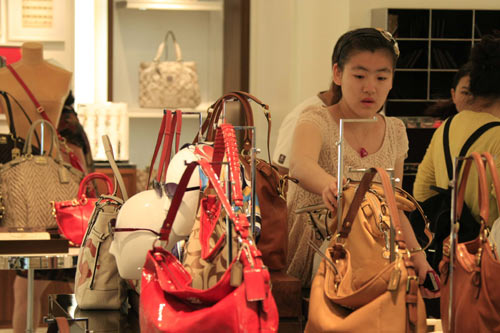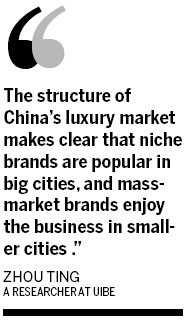Niche high-end products beat established brands
Updated: 2012-10-04 07:41
By Wang Wen (China Daily)
|
||||||||
|
 Shoppers select bags at a duty-free store in Sanya, Hainan province. Luxury, but without showing off, is what Chinese consumers look for now. Huang Yiming / China Daily |
Consumer preferences give boost to names that aren't well-known
When Sun Sisi planned to buy a new handbag, the 27-year-old Beijing office worker, who already owns some LV and Chanel handbags, turned her focus to niche brands this time.
"I am tired of the big names, and it is more important that I do not want a bag that many people on the street already have," Sun said.
Sun is not the only one thinking this way in China's big cities.
Luxury, but without showing off, is what Chinese luxury consumers are looking for now, especially in cities like Beijing and Shanghai.
The luxury consumers' new preference has helped some niche brands, which are not well-known, to grow fast in China, while some mass-market brands are seeing slower growth.
Burberry Group PLC, which recently released its trading update for the three months through June 30, said its revenue growth in the Asia-Pacific area dropped to 18 percent from 67 percent in the same quarter of 2011.
Gucci brand's sales in the Chinese mainland increased by 17.2 percent in the first half of 2012 compared with the same period of 2011.
Meanwhile, leather-goods maker Bottega Veneta, which targets an elite clientele and insists on no logo, had a 62.4 percent sales growth in the mainland during the period, according to the half-year result of PPR SA, which is the parent company of both Gucci and BV.
"Chinese luxury consumers are gradually giving up the brands, which the public is familiar with, and picking up the niche brands," said Zhou Ting, executive director of the research center for luxury goods and services at the University of International Business and Economics in Beijing.
This is normal for luxury consumers in big cities, where the familiar brands' market is saturated, and price is no longer their concern, Zhou said.
"People in big cities start to look for the luxury items that are more suitable for them and different from others'," she added.
Twenty-six luxury brands attended the Sparkle Roll Luxury Brands Culture Expo in Beijing in early September, and most of them are not well-known by the public, like Parmigiani, DeWitt and Royal Asscher.
But the low publicity does not affect the brands' business in China.

Sparkle Roll Group Ltd, which is a distributor of most of the brands attending the expo, said that it sold 150 Richard Millie, 102 DeWitt and 319 Parmigiani watches in 2011.
The 571 watches produced HK$188 million ($24.25 million) in sales for the company, which means the average price of each piece arrived at about 270,000 yuan ($42,800).
The high price is not a problem for Chinese multimillionaires, who are searching for suitable luxury items on which to spend their wealth.
Jerome De Witt, founder of Montres DeWitt SA, an independent watch brand from Switzerland that he established in 2003, explained why a price of tens of thousands of dollars does not deter Chinese people from buying the watches.
"We contact with consumers directly and share experience with people," De Witt said.
The luxury consumers care more about the experience of buying and wearing the watches, rather than the price, he added.
Montres DeWitt entered the China market four years ago and has three authorized stores - in Beijing, Shanghai and Dalian.
China already is one of the five main markets of Montres DeWitt and buys about 200 pieces from the stores every year, De Witt said.
Some niche brands got their buyers in China, even before they occur at China's market.
Laurent Lecamp and his young team came to Beijing for the luxury expo in September to introduce his brand - Cyrus, which is a new watch brand in Switzerland but received the award "Best Independent Brand" during the Nuit de I'horlogerie de Monaco (Watchmakers' Night of Monaco) in 2011.
"We do not have any distributors in China yet, but our products already have Chinese consumers, who bought the watches overseas," said Lecamp, founder and managing director of Cyrus Watches RL SA.
He said Cyrus is considering opening its stores in China, although only 480 Cyrus watches will be produced this year.
"Cyrus' consumers are the group of people who want to be different from others, no matter in China or any other countries in the world," Lecamp said.
Chinese luxury consumers' preference on the niche brands also shows the business opportunity to small French chateaus.
"Chinese residents do not just buy names, but the taste of wine they like," said Bernard de Laage de Meux, development director of Chateau Palmer in Margaux, a wine-producing region in Bordeaux.
He said that in the past, only the most famous wine brands, like Lafite and Latour, could be popular in China, but many Chinese consumers turn to the smaller chateaus now.
"Our chateau welcomed Chinese visitors almost every week, and they show their interests in our wine," he added.
Some uncommon luxury products also find their consumers in China.
Buben & Zorweg, the world's largest "time mover" manufacturer, has three boutiques in China, and the store in Beijing sells two products every month on average.
China is one of the brand's best markets, together with Middle East, eastern Europe and Russia, said Christina Zorweg, company president.
"Our customers are super-rich people who own several top watches before buying a time mover," Zorweg said. The buyers of time movers priced from 20,000 to 3 million yuan cannot show off the large products anywhere.
"They only enjoy our products at home," he added.
However, because of the low production rate and the attention on private contact, the business of niche brands is still around the big cities in China, and the mass-market brands occupy the larger market in second- and third-tier cities.
Consumers in smaller cities choose the luxury brands according to their publicity rather than the difference, UIBE's Zhou said.
"The structure of China's luxury market makes clear that niche brands are popular in big cities, and mass-market brands enjoy the business in smaller cities."
wangwen@chinadaily.com.cn











